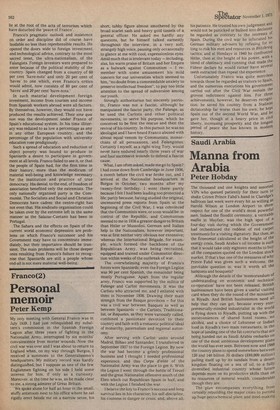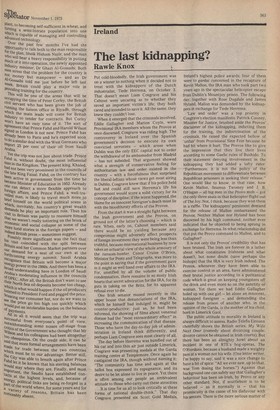Saudi Arabia
Manna from Arabia
Peter Hobday
The thousand and one knights and assorted VIPs who queued patiently for their turn to
shake Crown Prince Fahd's hand in Claridge's ballroom last week were every bit as willing a5
Harold Wilson at London Airport to show respect for one of the world's most powerful men. Indeed the floodlit ceremony, a veritable majlis in Mayfair, was the high spot of a four-day visit during which the Government had orchestrated the reddest of red carpet treatments for a visiting dignatory. But then, as. the Economist calculated at the height of the energy crisis, Saudi Arabia's oil income is such that it would take only eighteen months to buY all the companies quoted on the London stock market. If that's but one of the measures of whY Prince Fahd was given such a welcome, the inevitable question is: was it worth all the banquets and bouquets? Although the details of the 'memorandum of understanding on economic and technical co-operation' have not been released, British businessmen have been given a useful visiting card when they do the round of the ministries in Riyadh. And British businessmen need all
help that they can get, because every entrpreneurially-minded industrialist in the World
is flying down to Riyadh, putting up with the inconveniences of shared hotel rooms, nd alcohol, and a choice of Lebanese or Indian food in Riyadh's two main restaurants, in the hope of landing one of the fat contracts that are being handed out as Saudi Arabia embarks on one of the most ambitious development plans
the world has ever seen. Between now and 1990 the country plans to spend somewhere between 120 and 140 billion JS dollars (£80,000 million) pulling itself up by its sandals from a desert
kingdom floating on a sea of oil, to a fully diversified industrial country whose future depends more on its productive skills than on its resources of mineral wealth, considerable though they are. The plan encompasses everything from virtually rebuilding the major cities to putting up huge petrochemical plant and steel-making Plant, to becoming self-sufficient in wheat, and turning a semi-literate population into one Which is capable of managing and controlling advanced technology.
Over the past few months I've had the oPPortunity to talk both to the man responsible
for the plan, Sheik Hisham Nazir, and the man who will bear a heavy responsibility in putting much of it into operation, the newly appointed
industry minister, Dr Ghazi Al-Gossaibi. Both men stress that the problem for the country is not money but manpower — and as Dr Al-Gossaibi told me just before he left last week, Britain could play a major role in Providing training for the country. This will be one of the areas that will be Occupying the time of Peter Corley, the British civil servant who has been given the job of running the liaison office in Riyadh, through Which the main leads will come for British industry to tender for contracts. But Corley Won't have an easy time of it. The sort of agreement that Prince Fahd and Harold Wilson signed in London is not new. Prince Fahd has already been to Paris and he's expected soon to do a similar deal with the West Germans who IniPort 25 per cent of their oil from Saudi Arabia.
Yet the trip was not just about trade. Prince Fahd is, without doubt, the most influential man in the Kingdom. The present king, Khaled, had not been very prominent in the councils of the late King Faisal. Fahd, on the contrary has been active in government from the time he became Minister of Education in 1952. Already °Ile can detect a more flexible approach to foreign affairs, and Prince Fahd, a well-travelled man, is likely to travel much more to l'rlef himself on the world political scene in winch, inevitably, his country's great wealth demands he play an important role. Thus his visit to Britain was partly to reassure himself that we weren't really tottering on the brink of economic and social collapse as some of the M. ore lurid stories in the foreign papers — and indeed British press.— sometimes suggest. 13°ssiblY more significant was the fact that 11, visit coincided with the split between —Main and her Common Market partners over our demand for a seat of our own at the forthcoming energy summit. Saudi Arabia recognises that Britain will become a major energy power in the 1980s. And there has been a broad understanding here in London of Saudi Arabia's moderating influence in the councils 9PEC. After all, the British don't want to see their North Sea oil deposits become too cheap, ,v.ibich is what would happen if the oil producers listened to President Ford and pegged the price. Wearing our consumer hat, nor do we want to wsee the price go too high too quickly which ould put an intolerable burden on the balance °f Payments. All in all it would seem that the trip was successful from everyone's point of view, notwithstanding some noises off-stage from c,r1tics of the Government who thought that Mr ,wilson and his colleagues had been altogether Loco obsequious. On the credit side, it can be said that more formal arrangements have been mad. e for trade between the two countries Inch must be to our advantage. Better still, the City was able to breath again after Prince ahd let it be known that his sterling balances timid stay where they are. Finally, and most 1,rnportant, the Saudis have established conacts at the highest levels, and, because of energy, political links are being re-forged in a P_ art of the world where, for some years and for a variety of reasons, Britain has been noticeably absent.

































 Previous page
Previous page